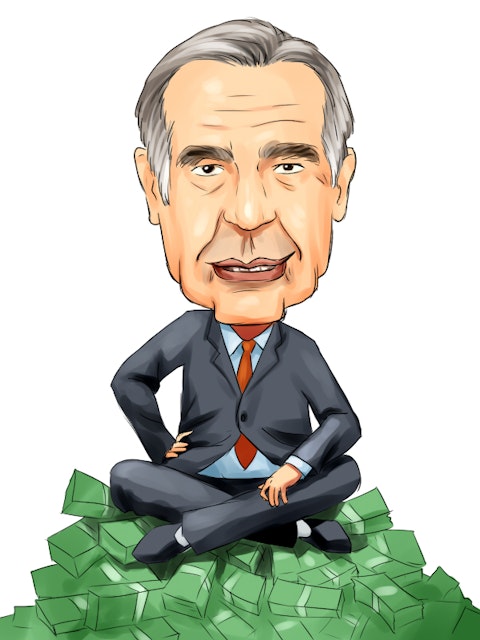In this article, we will take a detailed look at the 15 most feared activist hedge funds.
Activist investors are a force to reckon with, given their profound impact on companies worldwide and their influence on investor’s actions. They stand out from normal investors in buying large stakes in publicly traded companies to effect changes that they believe will unlock additional value.
While public pension funds and mutual funds also participate in stock activism, activist hedge funds often hold significant positions and use extra leverage from derivatives such as stock options to compensate for the costs of such campaigns. Additionally, activist hedge funds acquire positions in struggling companies just before advocating for change, aiming to benefit from the ensuing improvement and increase in stock value.
Activist investors declare their initiatives by submitting a Schedule 13D form to the U.S. Securities and Exchange Commission (SEC), which must be submitted within ten days after acquiring 5% or more of a company’s voting class shares. They often initiate their campaigns for board positions in the early months of the year, as they prefer to introduce new members to the board just before the company’s annual general meeting they aim to influence.
READ ALSO: Shake-Up Alert: 40 Companies Facing Activist Pressure.
In contrast to private equity groups that purchase and transform businesses to make a profit upon their sale, activist investors rarely obtain complete or controlling ownership. Instead, they rely on public statements and confidential talks to gain support from other shareholders and within the company. Should these strategies not succeed, an activist investor might seek a proxy battle to install new board members, aiming to compel the company to fulfill their requests.
A company might attract the attention of the most feared activist hedge funds if it needs to be better managed or has high expenses. In some cases, it might be targeted if the investors wish to take the company private or plan to push for the sale of some units as one way of unlocking additional value. It might also be targeted if the activist investors believe it is a problem they can fix to generate more value.
While activist hedge funds’ modest goal may be to advise company management, in most cases, they are known for their aggressive actions. They push for seats on the board as one of the ways of influencing a company’s strategic direction through decision-making. Some activist investors have gained prominence for forcefully entering into failing businesses and subsequently pushing for management changes, warning off board members—and occasionally, even CEOs.
However, the majority of activist campaigns take place behind the scenes. Roughly two-thirds of the battles occur behind closed doors, whereby agreements are reached without the public ever knowing. It’s only when activist hedge funds or investors feel they are getting a cold shoulder from management or board that they go public in a bid to win shareholders’ support.
Elliott Management is arguably one of the most feared activist hedge funds as it has targeted some of the biggest companies and taken on some of the most prominent investors, including Warren Buffett. Nevertheless, it is not the only one in the highly competitive field, as Starboard Value L.P. and Trian Partners, among others, are always looked upon by investors looking for highly undervalued stocks with tremendous upside potential.
2023 was one of the most successful years for activist hedge funds as they roared back to life on losing an average of 16% in 2022. As the overall stock market turned bullish in 2023, with the S&P 500 rallying by 24%, activist investors generated an average return of 20.2%, erasing a significant chunk of the losses accrued in 2022.
Some of the most feared activist hedge funds that came out on top included Value Act Capital, which posted a return of 39% better than the S&P 500. Caligan Partners was also up by 37% and Engaged Capital posted a return of 29%.
As interest rate hikes and other factors slowing growth hurt some companies, activist investors successfully pushed for cost cuts, management changes, and strategic alternatives. Many boards only realized too late that it takes more than refreshing directors to offset down performance in today’s climate.
In the first six months of 2024, the 15 most feared activist hedge funds launched a record number of campaigns. Investment firm Barclays tracked 147 activist campaigns, a new record from the previous high of 143 campaigns in the first half of 2018. In the second quarter alone, there were 86 campaigns, with Elliott Management launching 11 campaigns and committing close to $11 billion in capital.
The increased activist campaigns threaten to trigger costly battles between activist shareholders and management amid the push for leadership changes, spin-offs, and outright sales of underperforming companies or units.

Our Methodology
After sifting through numerous media reports from the past and the present, we curated a list of the most prominent activist investors. We then picked the hedge funds with the largest portfolios and ranked them in ascending order of their portfolio sizes, as of Q1 2024.
At Insider Monkey we are obsessed with the stocks that hedge funds pile into. The reason is simple: our research has shown that we can outperform the market by imitating the top stock picks of the best hedge funds. Our quarterly newsletter’s strategy selects 14 small-cap and large-cap stocks every quarter and has returned 275% since May 2014, beating its benchmark by 150 percentage points (see more details here).
15 Most Feared Activist Hedge Funds
15. Engine No. 1
Portfolio size: $84.48 Million
Founded in 2020 by Christopher James, Engine No1 is one of the most feared activist hedge funds on Wall Street and the smallest given the size of its portfolio. The hedge fund controlled about $84.48 million worth of portfolio at the end of the first quarter of 2024.
The little-known hedge fund burst into the scene in 2021 as it pushed for board seats at oil giant Exxon Mobil Corporation (NYSE:XOM) despite holding a 0.02% stake. Ultimately, it ended up securing three seats on the board, gaining the much-needed say to influence Exxon Mobil Corporation (NYSE:XOM)’s decision-making process, especially concerning climate change matters.
The prolonged proxy battle garnered support from prominent investors like BlackRock and Vanguard. These actions differentiate them from the strategy that propelled Engine No. 1 to prominence: its powerful and effective battle against Exxon Mobil Corporation (NYSE:XOM). It made other companies and their consultants nervous and highlighted a new category of small yet assertive activist shareholders capable of securing tiny shares and advocating for modifications.
Nevertheless, the hedge fund has always insisted that public proxy fights as part of stock activism are not core to its strategy. Instead, the chief investment officer and founder, Chris James, insists they operate as average investors with activism a toll of last resort rather than a core strategy.
14. Barington Capital Group
Portfolio Value: $101.58 Million
Established in January 2000 by James A. Mitarotonda, Barington Capital Group is one of the 15 most feared activist hedge funds. It boasts of a highly diversified portfolio worth $101.58 million. The activist hedge fund primarily invests in industrial stocks, with consumer cyclical stocks like Mattel Inc (NASDAQ:MAT) and technology stocks accounting for a significant chunk of the portfolio.
It focuses on investing in companies whose stock prices are undervalued, expecting a substantial increase in value due to changes in business strategy, operational enhancements, better allocation of capital, or improved governance.
Over the past year, the hedge fund has launched a series of activist campaigns, one at toymaker Mattel Inc (NASDAQ:MAT), which includes pushing the company to divest its Fisher-Price and American Girl brands and separating the CEO role from the chairman. Barrington is also pushing TriMas Corporation (NASDAQ:TRS) to focus on the packaging business and divest non-core units as one of the ways of generating some value while focusing on the core business.
Leveraging its broad experience in strategy, operations, and board meetings, the activist hedge fund also advocates divesting some business units in companies in which it gets involved, like Mattel Inc (NASDAQ:MAT). The divestment strategy is part of eliminating underperforming units to ensure a company focuses on the core business that generates more value.
13. Engaged Capital
Portfolio Size: $617.10 million.
Engaged Capital is one of the most feared activist hedge funds focusing on constructive activism tailored towards delivering superior long-term risk-adjusted returns for shareholders. Founded in 2012 by Glenn Welling, it started with an initial investment of $85 million. It currently controls a portfolio worth $617.10 million with holdings in technology services and consumer cyclical sectors.
Engaged capital activism focuses on underperforming companies trading below their fair value, such as V.F. Corporation (NYSE:VFC). The activist hedge fund gets involved by acquiring significant stakes and pushing for corporate governance policies to enhance shareholder value. It also advocates for management changes as one of the ways of getting its preferred candidates with the experience and expertise to reinvigorate growth prospects.
The activist hedge fund also pushes for operational improvements and cost reduction, as at V.F. Corporation (NYSE:VFC), to bolster profit margins and generate optimum shareholder value. In some cases, it advocates for strategic reviews that include selling non-core assets or the entire business if it’s the only option left to generate value. Board refreshment, including pushing for seats on the board, is also part of the strategy that the hedge fund deploys to try and advocate for change and influence a company’s direction to unlock any hidden value.
The small-cap investor that makes investments with a two or five-year investment horizon has targeted consumer footwear and apparel maker V.F. Corporation (NYSE:VFC). It is pushing the company to consider reducing operational costs and restoring brand autonomy.
Engaged Capital is also pushing debt collection company PRA Group, Inc. (NASDAQ:PRAA) to focus on improving its operations, cutting costs, and adding new experience to its leadership as part of its activist campaign.
12. Jana Partners
Portfolio Size: $1.83 billion
Founded in 2001, Jana Partners is one of the most feared activist hedge funds focusing on companies changing and needing operational improvement. Founded by Barry Rosenstein, the hedge fund buys significant stakes in companies it believes are underperforming and starts pushing for changes that will help improve performance, as is the case at Wolfspeed, Inc. (NYSE:WOLF).
The activist hedge fund earned its reputation by adopting stances backed by thorough research and detailed strategies for long-term growth. Rosenstein refers to this approach as V cubed a three-pronged plan. Value is the first strategy that entails acquiring assets at the optimal price; Votes: understanding your position in the voting process before initiating a proxy battle; and Variety of strategies: employing multiple approaches to increase value and facilitate the exit from an investment.
Since 2008, the company has progressively moved away from this approach, adopting a new strategy described as the three “Shs,” which include Stock price – acquiring assets at the right price; Strategic activism like the campaign at Wolfspeed, Inc. (NYSE:WOLF) – either selling the company or divesting a business unit; and Star advisors/nominees – partnering with leading figures in the industry to provide advice and secure board positions if needed.Its activist campaign pushes for board seats and calls for selling some units or the entire business.
The hedge fund returned 31% in 2023 as it went for changes at Whole Foods and Frontier Communication. Its returns were bolstered by a successful activist campaign at Freshpet, Inc. (NASDAQ:FRPT), where it secured board seats, and at software company New Relic. Jana Partners has also sent a letter to Wolfspeed, Inc. (NYSE:WOLF) urging the company to review strategic alternatives, including selling the entire company.
11. Corvex Capital
Portfolio Size: $2.16 Billion
Founded by Keith Meister in December 2010, Corvex Capital is one of the most feared activist hedge funds. It follows a core strategy based on values, using its ability to participate actively in situations to find opportunities with high risk reward opportunities like Algonquin Power & Utilities Corp. (NYSE:AQN). Consequently, it invests in high-quality companies adapting to changes in their industries, which are supported by long-term positive trends.
Corvex is a highly focused, deeply motivated investment fund that employs activism as a method but not as its primary approach. The company leans towards not adopting an activist stance, considering a proxy battle as a measure of last resort. It favors a cooperative approach, aiming to be welcomed onto boards like at Algonquin Power & Utilities Corp. (NYSE:AQN).
However, when management gives it a cold shoulder, the hedge fund often engages in public activism as one of the ways of getting shareholders on board to push for changes that can unlock additional value. The activist hedge fund does not take positions to micromanage companies but to influence the strategic direction through cost cuts, unit sales, or divestments.
After taking a 4.4% stake in Entain, the activist hedge fund called for changes in the company’s strategic direction to improve its performance; the hedge fund has also taken an activist position at Algonquin Power & Utilities Corp. (NYSE:AQN), whereby it is in discussion with the board about pursuing strategic changes that could unlock value. The activist hedge fund has also taken a position at Vestis Corporation (NYSE:VSTS), a provider of uniform rentals and workplace supplies, with plans that could open the door for it to push for board seats.
10. Sachem Head Capital
Portfolio Value: $2.34 billion
New York-based Sachem Head Capital is an oriented investment management firm that also engages in activist investment to unlock shareholder value. Founded in 2012 by Scott Fergusson, it boasts a portfolio value of $2.34 billion, primarily invested in basic materials and technology stocks, including Twilio Inc. (NYSE:TWLO).
Sachem Head’s investment strategy is focused on value-oriented, concentrated long/short investments with an activist overlay. The hedge fund first became known in the activist scene in 2020 when it invested in Olin and pushed for a board seat as it sought to tweak the company’s strategic direction. It followed the trend by going for three board seats at U.S. Food.
The push for board seats, as at Twilio Inc. (NYSE:TWLO), has always been Sachem Head Capital’s go-to activist investment strategy that focuses on influencing the decision-making process to generate more shareholder value.
Ferguson is on record saying that the most challenging part for activist investors is replacing CEOs in companies where they get involved. The activist hedge fund has previously taken stakes in chemicals company Olin Corporation (NYSE:OLN). Recently, the hedge fund has built a 3.6% stake in Delivery Hero and is seeking a seat on the board as part of its activist campaign. At Twilio Inc. (NYSE:TWLO), the activist hedge fund is pushing for board seats to ensure the company turns its first profit after years of loss-making despite revenue growth.
9. Ancora Holdings
Portfolio Size: $4.40 Billion
Ancora Holdings is one of the most significant hedge funds that engage in activist investments to unlock optimum value from its holdings. It operates as an investment advisory firm providing services through various investment advisers, including Ancora Advisors, Ancora Alternatives LLC, and Ancora Family Wealth Advisors LLC.
Over several years, the hedge fund has increased its involvement by acquiring significant stakes in more prominent firms like Norfolk Southern Corporation (NYSE:NSC), often below 5%. The alternatives team is known for its history of engaging in both private and when needed, public interactions with the companies in its portfolio to drive enhancements in corporate governance and the creation of long-term value. The hedge fund’s strategy in activist investment focuses on pushing for management changes in companies in which it gets involved as at Norfolk Southern Corporation (NYSE:NSC).
While controlling a portfolio worth $4.4 billion, the hedge fund primarily invests in services, technology, and basic material stocks. Its most recent activist campaigns have been at Elanco Animal Health Incorporated (NYSE:ELAN), where it has secured two seats on the board as part of its campaigns. With the two board seats, the activist hedge fund is pushing for the Chief executive officer’s resignation over poor performance over the past few years. It has also waged a campaign at rail giant Norfolk Southern Corporation (NYSE:NSC), whereby it has nominated three directors as it seeks to take control.
8. ValueAct Capital
Portfolio Size: $4.54 Billion
As one of the most feared activist hedge funds on Wall Street, ValueAct Capital is known for its soft activist approach, as the one pursued at The Walt Disney Company (NYSE:DIS). While the hedge fund focuses on a long-term investment approach, it boasts a low turnover.
Unlike most popular and large hedge funds known for their aggressive activist campaigns, Value Act Capital deploys a friendlier investing style of negotiating with the management. Upon taking long-term positions in large companies, like at The Walt Disney Company (NYSE:DIS), the activist hedge fund engages in private discussions with management and pushes for changes to unlock additional value.
Consequently, Value Act Principals are on the boards of half of the portfolio positions in which they have invested. They have maintained 56 public company board seats over the past 23 years. Its latest position is in Disney, where the activist investor has maintained discussions with the board.
With a portfolio value of $4.5 billion, Value Act Capital, the hedge fund posted a 39% return in 2023. Thanks to its investments in Microsoft Corporation (NASDAQ:MSFT), The Walt Disney Company (NYSE:DIS), and Salesforce Inc (NYSE:CRM), which posted double-digit gains, Value Act Capital’s chief investment officer joined the Salesforce board in 2023 after a successful campaign. The hedge fund also agreed to defend entertainment giant Walt Disney, which is under immense activist pressure.
7. Starboard Value L.P.
Portfolio Size: $4.84 Billion
Starboard Value is one of the most feared activist hedge funds that invest in undervalued companies like Alight, Inc. (NYSE:ALIT) and engages management teams and boards to unlock shareholder value—founded in 2011 by Jeff Smith, the activist hedge fund generated annualized returns of 15% through 2014 from its inception.
Starboard Value aims to invest in significantly undervalued companies and proactively work with their management and board members to find and implement strategies to increase value for all investors’ advantage. The hedge fund boasts extensive experience helping companies focus on operational efficiency and margin improvement, like at Alight, Inc. (NYSE:ALIT), as part of its activist campaigns.
One of the hedge fund’s notable activist targets is Salesforce Inc (NYSE:CRM), whose stake surged by over 70% after Starboard Value invested. With a portfolio value of about $4.84 billion, the hedge fund has also launched campaigns for Kohl’s and Mercury systems. The activist hedge fund has also built a 7.8% stake in benefits services provider Alight, Inc. (NYSE:ALIT) and pushed for board seats.
Additionally, Match Group, Inc. (NASDAQ:MTCH) received a communication from Starboard outlining ways to enhance its business processes, financial outcomes, and investment strategies. This encompasses refining Tinder by developing new products, reducing expenses, increasing profit margins, and launching a proactive and organized program for returning capital. Another option being considered is to acquire the company privately.
6. Glenview Capital
Portfolio size: $5.72 billion
Glenview Capital is one of the prominent hedge funds on Wall Street, controlling a portfolio worth about $5.72 billion. The hedge fund made a name for itself in 2013 when it returned 84.2% profit, the highest of any hedge fund. Likewise, it averaged an annualized return of 13.4% between 2003 and 2013, shrugging off the financial crisis that wiped out many hedge funds.
Founded in 2000, the hedge fund oversees several private investment funds, investing in the equity market and pursuing activist targets. Its portfolio includes vast holdings in the healthcare sector, with the service sector accounting for a chunk of the portfolio. Some of the hedge fund’s most significant holdings include Tenet Healthcare Corporation (NYSE:THC) and The Cigna Group (NYSE:CI), which account for about 20% of the portfolio.
Glenview’s approach to investing often involves looking for companies growing at a reasonable rate, known as “GARP,” like Tenet Healthcare Corporation (NYSE:THC). This strategy emphasizes investing in businesses within sectors that are stable and consistent, boasting regular income or strong market dominance.
In its activist campaign at Tenet Healthcare Corporation (NYSE:THC), the activist hedge fund pushed for changing the company’s bylaws to allow shareholders to take action by written consent without a meeting. It also pushed for removing the company’s directors as it sought management changes.
5. Third Point
Portfolio Size: $7.8 Billion
New York-based Third Point is one of the 15 most feared activist hedge funds known for its activist campaigns against corporate boards like at Advance Auto Parts Inc (NYSE:AAP). The hedge fund is known to instigate changes in various companies to maximize shareholder value.
Founded in 1995 by Dan Loeb, the activist hedge fund is back to winning after gaining 3.5% in 2023, recouping some of the 22% loss in 2022. The outperformance continued in the first quarter of 2022, with its Offspring fund up 8% and Ultra fund up 8.7%.
The activist hedge fund deploys an opportunistic event-driven approach to search for high-risk, high-reward opportunities. It also boasts an extensive history of pushing for changes in operations or entire portfolios to enhance long-term returns for investors by interacting with established, publicly traded firms. Part of the changes involve management changes and pushing for seats on the company’s board to be part of the decision-making process, as at Advance Auto Parts Inc (NYSE:AAP).
With a portfolio value of $7.8 billion, the activist hedge fund primarily invests in technology stocks and services sector companies. One of its latest activist campaigns was at Advance Auto Parts Inc (NYSE:AAP), where the hedge fund gained three board seats that gave it much-needed power to influence the company’s decision-making process and strategic direction.
4. Trian Partners
Portfolio Value $8.02 billion
In 2005, Nelson Peltz established Trian Partners as an activist hedge fund that pursues investment opportunities in “top-notch yet overlooked and struggling publicly traded companies. With a portfolio value of $8.02 billion, the hedge fund invests in financial and services companies like Rentokil Initial plc (NYSE:RTO).
Trian Partners is considered one of the most successful activist hedge funds as shares of companies it gets involved in gain an average of 17% better than the S&P 500. It concentrates on the areas of consumer, industrial, and financial markets.
The activist hedge fund is known for its role as a proactive investor and frequently secures positions on company boards to implement reforms as is at Rentokil Initial plc (NYSE:RTO). In addition to pushing for board seats, its investment thesis also focuses on selling some units or the entire business as one of the ways of unlocking additional shareholder value.
Trian Partners holds a limited number of investments but remains highly engaged in them. Peltz describes his approach as operational activism whereby they collaborate with the leadership of companies with significant potential but not performing well to increase profits by reducing costs, eliminating non-core operations, and – most importantly – enhancing well-known brands. One of its most recent activist campaigns is at Rentokil Initial plc (NYSE:RTO), which has opened discussions with the board to discuss ideas and initiatives to improve value.
3. Pershing Square
Portfolio Size: $10.76 billion
Established in 2004, Pershing Square Capital Management is a prominent hedge fund engaged in activist investment. Bill Ackman is the brainchild behind the New York City-based hedge fund, known for its activist investment approach. From the beginning, Pershing Square adopted a concentrated investment approach, maintaining a small number of holdings to facilitate thorough examination and direct interaction with the companies in its portfolio.
Its portfolio worth $10.76 billion is heavily invested in the services sector in the equity markets, with technology stocks accounting for 19.4% of the portfolio. The hedge fund returned 26.7% last year, beating the broader market and improving from an 8.8% loss recorded in 2022. Some of the hedge fund’s notable campaigns have been at Herbalife Nutrition Ltd. (NYSE:HLF), Zoetis Inc. (NYSE:ZTS), and Valeant Pharmaceuticals Intl Inc (NYSE:VRX).
Ackman is widely known for his $1 billion wager on Herbalife Nutrition Ltd. (NYSE:HLF), a nutritional company he called a pyramid scheme. His strategy is marked by his readiness to invest significant sums in thorough fundamental analysis and a solid belief in his evaluations of a company’s worth.
2. Icahn Capital L.P.
Portfolio Size: $11.92 Billion
Carl Icahn is one of the most revered activist investors because he has waged campaigns against some of the biggest companies. As the chairman of Icahn Enterprises, a publicly traded master limited partnership with a portfolio value of $11.92 billion, he maintains investments across different industries, including energy, automotive, food packaging, and real estate.
Carl Icahn’s approach to investing is centered on principles that go against the norm, frequently purchasing assets when seen as less valuable and favored. He usually focuses on shares with a low price-to-earnings (P/E) ratio or whose book values are less expensive. He holds significant stakes in businesses and pushes for modifications to enhance shareholder value like at JetBlue Airways Corporation (NASDAQ:JBLU).
Icahn often pushes for modifications in the management team as he seeks to get his men onto the board to influence the company’s actions and strategic direction. In some cases, he might push for the sale of the business or some units if it’s the only way to unlock value.
As the lone wolf of Wall Street, his notable activism was a battle against Bill Ackman over the nutritional supplement company Herbalife Nutrition Ltd. (NYSE:HLF). He also waged an activist campaign against the proposed takeover of Dell by Michael Dell and Silver Lake Partners. Recently, he has waged an activist campaign at JetBlue Airways Corporation (NASDAQ:JBLU) and Caesars Entertainment, Inc. (NASDAQ:CZR).
1. Elliott Management
Portfolio Value: $16.12 billion
Founded in 1977 by legendary investor Paul Singer, Elliott Investment Management is among the 15 most feared activist hedge funds. While managing two funds, Elliott Associates L.P. and Elliott International Limited, the hedge fund seeks to Influence the company’s management as part of its activist campaigns, as is the case at Southwest Airlines Co. (NYSE:LUV). The hedge fund is believed to have gained $5.5 billion in 2023.
The hedge fund also pushes for strategic changes, including cost cuts and selling underlying units or entire businesses to maximize shareholder value. Elliott Investment is best known for pressuring the companies’ leadership teams to make specific changes that would benefit the share price and shareholders. The hedge fund has taken activist stakes in more than 140 companies in the past three decades, including at Southwest Airlines Co. (NYSE:LUV).
With a portfolio value of about $16.12 billion, the hedge fund primarily invests in corporate real estate and sovereign debt. Its portfolio also includes stakes in basic materials companies, technology, healthcare, consumer cyclical, and financial services. The hedge fund has experienced only two periods of economic loss in fifty years.
Some of its latest activist campaigns are on Texas Instruments Incorporated (NASDAQ:TXN), whereby it has amassed a $2.5 billion stake and is pushing the company to improve its free cash flow by adopting a less rigid plan for capital expenditure. It has also launched an activist campaign at Southwest Airlines Co. (NYSE:LUV) and demanded the company fire CEO Bob Jordan and Chairman Gary Kelly as the company has suffered from margin deterioration and stock drop over the past four years.
Tracking the moves made by some of the most significant activist hedge funds is one of the best ways of uncovering high-risk reward opportunities trading at discounted valuations. However, given that the artificial intelligence arms race is just starting, under-the-radar A.I. stocks are trading at highly discounted valuations with incredible promise for anyone looking to diversify their portfolio. If you are looking for an A.I. stock that is more promising than the top activist investment plays, check out our report about the cheapest AI stock.
READ NEXT: $30 Trillion Opportunity: 15 Best Humanoid Robot Stocks to Buy According to Morgan Stanley and Jim Cramer Says NVIDIA ‘Has Become A Wasteland’.
Disclosure: None. Insider Monkey focuses on uncovering the best investment ideas of hedge funds and insiders. Please subscribe to our free daily e-newsletter to get the latest investment ideas from hedge funds’ investor letters by entering your email address below.





